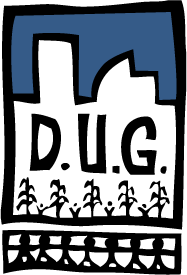Last week speaker Shannon Spurlock- Denver Urban Gardens
Urban Gardens Are a Vision of the Community
Shannon Spurlock from Denver Urban Gardens (DUG) braved the snow and cold last week to talk to us about this wonderful organization.
In 1985, communities in Denver approached the CSU extension office and asked them to teach and guide Denver residents the art of gardening. Denver Urban Gardens was born. They supported three community gardens in those days, today they support 150 gardens in five counties.
DUG's vision is to partner with community gardens to promote strong, neighborhood leadership, outreach and volunteerism; it is community development through the act of growing food.
The gardens are located on community land, such as churches, and public schools. Because it is a community garden, the garden is a vision of the community. They develop it, organize it, and benefit from it. Children and families are the biggest benefactors. The kiddos who learn to grow their own food, will want to eat their own food, they expand their palates and eat healthier. Families who grow their own food can further their household budget and provide food security for their families.
On a larger scale, the urban farm in Aurora is community supported agriculture or CSA. The DeLaney Community Farm is located on five acres of land, three of which are cultivated, at 1st and Chambers. The farm grows fruits and vegetables which is then given to the CSA community as part of their shares. CSA is a program that local residents buy into, they buy into the risk and rewards of farming. Each week during the growing season they go to the farm and pick up their shares of that weeks bounty until the growing season is over. The program supports the economic development of the farmer and the community gets to reap the benefits by eating fresh organic fruits and vegetables.
DUG who supports and partners with DeLaney farms also works with with WIC (Women, Infants, and Children) a federally subsidized program. DUG provides the WIC recipients the opportunity to volunteer or garden at the farm for one hour and they go home with a bag of food and healthy recipes. The program also doubles the food vouchers the WIC program gives them. The recipients learn a skill they can take with them and hopefully a new found love of healthy food.
DUG's vision of sustainability, food security, community development, and partnerships has given the citizens of Denver the opportunity to grow slow food, meet folks in their communities, and learn a new skill. It is an organization whose "gardens grow." Many thanks to Shannon for her insightful and informational presentation!
